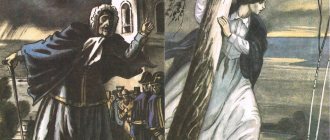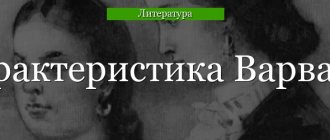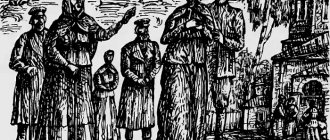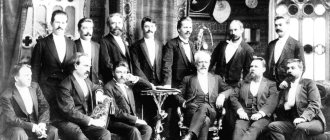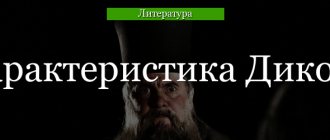Description of the city of Kalinov in the play The Thunderstorm - quotes
The action of the drama “The Thunderstorm” takes place in the provincial town of Kalinov, in a beautiful area on the banks of the Volga:
“The view is extraordinary! Beauty! The soul rejoices. <…> Delight! And you are “something”! Have you looked closely, or don’t understand what beauty is poured into nature.”
We learn about the morals of the inhabitants of the city of Kalinov from the words of the tradesman Kuligin, one of the heroes of “The Thunderstorm”. In his opinion, “cruel morals,” “rudeness and poverty” reign in the city:
“Cruel morals, sir, in our city, cruel! In philistinism, sir, you will see nothing but rudeness and naked poverty.”
The main representatives of savagery, ignorance and cruelty in the city of Kalinov are two bright personalities: the merchant Dikoy and Kabanikha. Merchant Dikoy is a rich and influential, but ignorant and cruel man. For example, Dikoy is convinced that thunderstorms are sent to people as punishment and that lightning rods are not needed. This is more than an ignorant approach:
“A thunderstorm is sent to us as punishment, so that we can feel it, but you want to defend yourself, God forgive me, with poles and some kind of rods.” (words of the Wild)
It is obvious that the merchant Dikoy successfully runs his business and counts money well, but this is where his horizons are limited. There is no doubt that the other merchants in the city are similar to the Wild One. The illiterate Dikoy, for example, calls electricity “elistry.” Apparently, he, like most of the inhabitants of the city, does not know about the discovery of electricity: Kuligin. Electricity. Wild (stomping his foot). What other beauty there is! The majority of the inhabitants of Kalinov are poorly educated merchants, townspeople and peasants. Even the rich inhabitants of Kalinov, who have access to books and newspapers, are not distinguished by their education. In Kalinov, influential, rich people do not respect government officials. For example, the merchant Dikoy treats the mayor as his friend:
“Your uncle patted the mayor on the shoulder and said: “Is it worth it, your honor, for us to talk about such trifles!”
The poor people in Kalinov sleep 3 hours a day because they work “day and night”:
“The poor, sir, have no time to walk, they work day and night. And they sleep only three hours a day.”
In the city of Kalinov, people with money are trying to “enslave” the poor and get even richer at the expense of cheap labor. This is exactly what the merchant Dikoy does, who has yet to pay anyone a salary without cursing:
“And whoever has money, sir, tries to enslave the poor so that he can make even more money from his free labors. Do you know what your uncle, Savel Prokofich, answered to the mayor? The peasants came to the mayor to complain that he would not disrespect any of them…”
The merchants of the city of Kalinov are at enmity with each other, plotting intrigues and going to court, bribing officials:
“And among themselves, sir, how they live! They undermine each other's trade, and not so much out of self-interest as out of envy. They are at enmity with each other; They get drunken clerks into their high mansions, such, sir, clerks that there is no human appearance on him, his human appearance is hysterical. And they, for small acts of kindness, scribble malicious slander against their neighbors on stamped sheets. And for them, sir, a trial and a case will begin, and there will be no end to the torment...”
Obviously, high art is not held in high esteem by the residents of the city of Kalinov. The self-taught Kuligin does not dare to write poetry because he is afraid that he will be “swallowed alive”:
“Boris. Can you write poetry? You would have written it. It would be interesting. Kuligin. How is it possible, sir! They will eat you, they will swallow you alive.”
The city of Kalinov lives its boring and monotonous life. Illiterate residents of Kalinov receive information about the world not from newspapers and books, but from wanderers, such as, for example, Feklusha. She reports that there are unknown countries where people with dog heads live, etc.:
“Because of my weakness, I did not walk far; and to hear - I heard a lot. They say that there are such countries, dear girl, where there are no Orthodox kings, and the Saltans rule the earth. And then there is also a land where all the people have dog heads.”
The ignorant inhabitants of Kalinov willingly believe such “enlighteners.” Residents of the town, for example, believe that Lithuania fell from the sky:
1st. And they say, my brother, it fell on us from the sky. Woman . Explain again! Everyone knows what comes from heaven; and where there was some kind of battle with her, mounds were poured there for memory. 1st. What about you, my brother! It's so accurate!
The rich inhabitants of the city do not walk along the boulevard in the evenings, but lock themselves at home early and let their dogs out in fear that they will be robbed:
“What do the rich do? Well, why don’t they, it seems, go for walks and breathe fresh air? So no. Everyone’s gates, sir, have been locked for a long time, and the dogs have been let down...”
The rich residents of Kalinov “eat” their households and tyrannize them, but they do it behind their fences so that no one will find out. Of course, we are talking, first of all, about the Kabanov and Dikiy families:
“...Do you think they are doing something or praying to God? No, sir. And they don’t lock themselves away from thieves, but so that people don’t see them eating their own family and tyrannizing their family. And what tears flow behind these constipations, invisible and inaudible! And what, sir, behind these castles is dark debauchery and drunkenness! And everything is sewn and covered - no one sees or knows anything, only God sees! Rob orphans, relatives, nephews, beat up his family so that they don’t dare make a squeak about anything he does there. That’s the whole secret.”
Fortunately, in this whole gloomy picture there are also bright touches, for example, couples in love walking around the city at night:
“Do you know, sir, who is hanging out with us? Young boys and girls. So these people steal an hour or two from sleep, and then walk in pairs.”
From work experience Lesson. Topic: Drama "Thunderstorm". The city of Kalinov and its inhabitants.
Lesson 33. Topic: Drama “Thunderstorm”. The city of Kalinov and its inhabitants. Depiction of the “cruel morals” of the “dark kingdom”.
The purpose of the lesson:
- characterize the city of Kalinov, find out how people live here,
- answer the question: “Is Dobrolyubov right in calling this city a “dark kingdom”?”
During the classes
1.Checking the assignment: memorize the passage.
2. Image of the city of Kalinov.
We enter the city of Kalinov from the side of the public garden. Let's pause for a minute and look at the Volga, on the banks of which there is a garden. Beautiful! Eye-catching! So Kuligin also says: “The view is extraordinary! Beauty! The soul rejoices!” People probably live here peaceful, calm, measured and kind. Is it so? How is the city of Kalinov shown? Tasks for analyzing two of Kuligin’s monologues (act 1, scene 3; act 3, scene 3) 1. Highlight the words that especially vividly characterize life in the city. "Cruel morals"; “rudeness and naked poverty”; “You can never earn more than your daily bread through honest work”; “trying to enslave the poor”; “to make even more money from free labor”; “I won’t pay a penny extra”; “trade is undermined out of envy”; “they are at enmity”, etc. - these are the principles of life in the city. 2. Highlight the words that especially clearly characterize life in the family. “They made the boulevard, but they don’t walk”; “the gates are locked and the dogs are unleashed”; “so that people don’t see how they eat their family and tyrannize their family”; “tears flow behind these constipations, invisible and inaudible”; “behind these castles there is dark debauchery and drunkenness”, etc. - these are the principles of family life. Conclusion. If it’s so bad in Kalinov, then why is the wonderful view of the Volga shown at the beginning? Why is the same beautiful nature shown in the scene of the meeting between Katerina and Boris? It turns out that the city of Kalinov is contradictory. On the one hand, this is a wonderful place, on the other, life in this city is terrible. Beauty is preserved only in that it does not depend on the owners of the city; they cannot subjugate the beautiful nature. Only poetic people capable of sincere feelings see it. People’s relationships are ugly, their lives “behind bars and gates.” Questions for discussion 1. How can you evaluate Feklusha’s monologues (act 1, scene 2; act 3, scene 1)? How does the city appear in her perception? (Blah-alepye, wondrous beauty, promised land, paradise and silence.) 2. What technique does the author use when talking about life in the city? (Method of contrast.) 3. What are the people who live here like? (The residents are ignorant and uneducated, they believe Feklusha’s stories, which show her darkness and illiteracy: a story about a fiery snake; about someone with a black face; about time that is becoming shorter (act 3, scene 1); about other countries (action 2, phenomenon 1). The Kalinovites believe that Lithuania fell from the sky (act 4, phenomenon 1), they are afraid of thunderstorms (action 4, phenomenon 4).) 4. How is it different from the residents of the city of Kuligin? (An educated man, a self-taught mechanic, his surname resembles the surname of the Russian inventor Kulibin. The hero subtly senses the beauty of nature and aesthetically stands above other characters: he sings songs, quotes Lomonosov. Kuligin advocates for the improvement of the city, tries to persuade Dikiy to give money for a sundial, for lightning rod, tries to influence the residents, educate them, explaining the thunderstorm as a natural phenomenon. Thus, Kuligin personifies the best part of the city's residents, but he is alone in his aspirations, so he is considered an eccentric. The image of the hero embodies the eternal motive of grief from the mind.) 5 Who can we consider the “masters of the city”? How do these heroes appear on stage? (The playwright uses the stage technique of a prepared appearance - first others talk about the characters, and then they themselves go on stage.) 6. Who prepares their appearance? (Kudryash introduces Dikiy, Feklush introduces Kabanikha.) 7. How are the characters of Dikiy and Kabanikha revealed in their speech characteristics?
| Wild | Kabanikha |
| About him: “scold”; "Like I'm off the chain" | About her: “everything under the guise of piety”; “a prude, he lavishes on the poor, but completely eats up his family”; "swears"; "sharpenes iron like rust" |
| He himself: “parasite”; "damn"; “you failed”; "foolish man"; “go away”; “What am I to you - equal, or something”; “he’s the one who starts talking to the snout”; "robber"; "asp"; "fool" etc. | She herself: “I see that you want freedom”; “He won’t be afraid of you, and even less so of me”; “you want to live by your own will”; "fool"; “order your wife”; “must do what the mother says”; “where the will leads”, etc. |
| Conclusion. Dikoy - a scolder, a rude person, a tyrant; feels his power over people | Conclusion. Kabanikha is a hypocrite, does not tolerate will and insubordination, acts out of fear |
General conclusion. The Boar is more terrible than the Wild One, since her behavior is hypocritical. Dikoy is a scolder, a tyrant, but all his actions are open. Kabanikha, hiding behind religion and concern for others, suppresses the will. She is most afraid that someone will live in their own way, by their own will. The results of the actions of these heroes: - the talented Kuligin is considered an eccentric and says: “There is nothing to do, we must submit!”; - the kind, but weak-willed Tikhon drinks and dreams of breaking out of the house: “... and with this kind of bondage you will run away from whatever beautiful wife you want”; he is completely subordinate to his mother; - Varvara adapted to this world and began to deceive: “And I wasn’t a deceiver before, but I learned when it became necessary”; — educated Boris is forced to adapt to the tyranny of the Wild in order to receive an inheritance. This is how it breaks the “dark kingdom” of good people, forcing them to endure and remain silent.
3. Getting ready for the Unified State Exam
Why, judging by Katerina’s stories, is the world in which she grew up so different from Kalinov’s? Which answer options do you prefer?
1) As is usually typical for a person, Katerina idealizes the past and her parents’ home. 2) Ostrovsky introduces a story about Katerina’s childhood in order to further highlight the painful atmosphere of her present life, life in Kalinov in general.
3) Ostrovsky wants to show that Russia is going through a time of historical breakdown; patriarchal, conflict-free relationships are a thing of the past; The time has come when the human personality strives for freedom.
Lesson summary. The city of Kalinov is a typical Russian city of the second half of the 19th century. Most likely, A. N. Ostrovsky saw something similar during his travels along the Volga. Life in the city is a reflection of a situation where the old does not want to give up its positions and seeks to maintain power by suppressing the will of others. Money gives the “masters of life” the right to dictate their will to the “victims”. In a truthful display of such a life, there is the position of the author calling for it to be changed.
Homework
Describe Katerina;
answer the question: what is the heroine protesting against and how is her protest expressed?
Collective image
The image of the woman is not fictitious. Such wanderers really existed and were loved by residents of small towns. They were expected here because life seemed boring and monotonous to people. They knew nothing except their city. The uneducated population of Kalinov in the play is represented by a “dark kingdom” in which life is closed in on itself.
The people wanted spectacles, something spectacular, amazing . And they received it in the person of people like Feklusha. Wanderers came and talked about their adventures, rumors, gossip, and often lied. The meaning of their existence was absolution, theft and constant lies, which they had to resort to out of ignorance and lack of moral principles.
This is precisely the function of the narrow-minded wanderer in Ostrovsky’s work “The Thunderstorm”. It forces the reader to have a negative attitude towards ignorance and lies, exposing a new facet of the “dark kingdom”.
It is not for nothing that the heroine’s name became a household name after the publication of the play and came into use with the meaning “a person who spreads outright nonsense under the guise of correct reasoning.”
Source
